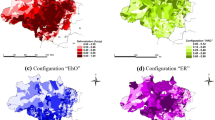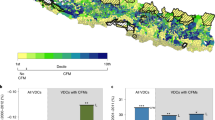Abstract
Economic reform in post-Soviet Russia has proceeded unevenly, resulting in broad variation between rural and urban areas. In the case study presented here, I examine how Communism's `economy of favors' has been transformed into a localized quasi-capitalist economy, which predominantly operates outside the national market economy. Using data from two villages in Tunkinskij Raion of the Buriat Republic in Russia, I look at how people at a micro-sociological level have adapted to current economic conditions. In particular I examine the relationships between informal networks and the ability to intensify agricultural production on household plots, to gain access to a variety of forest resources, and to find seasonal, part-time, or one-time work outside the household and the formal labor market.
Similar content being viewed by others
References
Andrews, Ed., 1997: How to make big rubles? Invest in a comrade's debt. New York Times. October 14, 1997.
Campbell, R.W., 1992: The Failure of Soviet Economic Planning. Bloomington, IN: Indiana University Press, Bloomington IN..
Creed, G., 1998: Domesticating revolution: from socialist reform to ambivalent transition in a Bulgarian village Pennsylvania State University Press, University Park, PA.
Eyal G., Szelenyi I. and Townsley E. 1998: Making Capitalism without Capitalists, Verso, London.
Forsyth J., 1992: A History of the Peoples of Siberia: Russia's North Asian Colony, 1581–1990. Cambridge University Press, London.
Gomboev B., 1996: The structure and process of land-use in inner Asia. In: Humphrey C. and Sneath D. (eds.), Culture and Environment in Inner Asia: The Pastoral Economy and the Environment, Vol. 1. The White Horse Press, Cambridge.
Humphrey C. 1983: Karl Marx Collective. Cambridge University Press, Cambridge.
Humphrey C., 1998: Marx Went Away, But Karl Stayed Behind. University of Michigan Press, Ann Arbor, MI.
Humphrey C. 1999: 'Traders, 'disorder,' and citizenship regimes in provincial russia' in Burawoy M. and Verdery, K. (eds.), Uncertain Transition: Enthnographies of Change in the Postsocialist World. K. Rowman and Littlefield Publishers, Inc., Lanham, MD.
Humphrey C. and Sneath D., 1999: The End of Nomadism? Society, State, and the Environment in Inner Asia. Duke University Press, Durham, NC.
Ledeneva A.V., 1998: Russia's Economy of Favors: Blat, Networking and Informal Exchange. Cambridge University Press, Cambridge.
McChesney A., 2000: FSC Grabs IOU Bull by the Horns. In: The St.Petersburg Times (from online archive at: http://www.sptimesrussia.com/).
Meshcheryakov A., 1996: “Vidish' korovu? Eto televizor...” (See that cow? It's a television...) Otkrytaya Politika 15(9–10): 52–57.
Rocheleau T.S. and Wangari, 1996: Feminist Political Ecology: Global Issues and Local Experiences. London, Routledge.
Rossijskoe Statisticheskoe Agenstvo. (Russian Statistical Agency, [RSA]), 1999: Sel'skoe Xoziajstvo Respubliki Buriatii (Agriculture in the Buriat Republic). Ulan-Ude: State Committee for Statistics, Republic of Buriatia. No. 03–11.
Staddon C.: 1999, Economic marginalisation and natural resource management in Eastern Europe. The Geographical Journal 165(2): 200–208 (also published in Bulgarian, in Problemite v Geografia, 1999, #1).
Tokarev S.: 1958, Etnografiia Narodov SSSR. Izdatel'stvo Moskovskogo Universiteta, Moscou.
Tolmachev V.I., 2001: State Ecology Inspector, Chair of Tunka State Committee on the Environment, personal communication.
Treml, V. and Michael A., 1994: The growth of the second economy in the Soviet Union and its impact on the system, in Robert Campbell (ed.) The Postcommunist Economic Transfromation: Essays in Honor of Gregory Grossman. Westview Press, Boulder.
Verdery K., 1996: What Was Socialism, And What Comes Next? Princeton University Press, Princeton, NJ.
Wedel J., 1998. Collision and Collusion: The Strange Case of Western Aid to Eastern Europe 1989–1998. St. Martin's Press, New York.
Woodruff, D. 1999: Money Unmade: Barter and the Fate of Russian Capitalism. Cornell University Press, Ithaca, NY.
Zhimbiev, B. 2000: History of the Urbanisation of a Siberian City: Ulan-Ude. White Horse Press, Cambridge, UK.
Author information
Authors and Affiliations
Rights and permissions
About this article
Cite this article
Metzo, K.R. Adapting capitalism: Household plots, forest resources, and moonlighting in post-Soviet Siberia1 . GeoJournal 55, 549–556 (2001). https://doi.org/10.1023/A:1021792929051
Issue Date:
DOI: https://doi.org/10.1023/A:1021792929051




